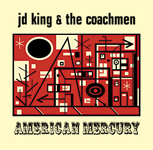|
|
 |
Dusted Reviews
Artist: J.D. King and the Coachmen Album: American Mercury Label: Ecstatic Peace! Review date: Oct. 15, 2006 |

|
|
|
 |
Had Thurston Moore not gone on to found Sonic Youth, The Coachmen would likely remain a obscure footnote in the history of New York’s late seventies underground. Their demo tape, entitled Failure to Thrive, documented the group’s Velvets-inspired rock, not enough to rocket the group to stardom, but a pleasant surprise when the recordings emerged posthumously in 1988, proving that the band was worth attention outside of being an early fragment of Moore’s pre-Sonic biography. No matter how much anyone enjoyed Failure to Thrive in ’88, though, a reunion was unlikely, and the days of The Coachmen seemed definitively over. When Ten Compositions: New Frontiers in Free Rock surfaced in 1999, 20 years after Failure to Thrive was recorded. The sound was nothing like the band’s earlier material, and founding member J.D. King was the only holdover from the band’s original line-up. American Mercury, the second release from this second incarnation of the group, continues The Coachmen’s forays to rock’s outer edges.
There’s a hint in American Mercury of the ragged energy that fueled The Coachmen’s music decades ago, but this new version of the group engages rock music in a wholly different way. Melody and steady rhythm aren’t entirely MIA, but King’s newest compositions rely heavily on abstraction and recontextualization, with little at all (aside from King’s involvement) to link this group to the original Coachmen. Slow burners like “Bees Caught in the Wrong Hive” and “In Memory of John Morrison Birch” brood and simmer under cloudy skies, while (most notably on “Untitled #17”) guitars are used for an Eastern-tinged sitar effect with listenable, if somewhat transparent results. There are rockers, too, like “Hot Rods and Electric Guitars,” though at the group’s most raucous, King’s composition keeps things intentionally frustrating, with lines disconnected, and rhythms left to strike out on their own under the fuzzed-out commotion. Stabs at psychedelia are often shortchanged; “ Magic Hour Glass Shoppe” is undercut buy a tremendously insistent drumbeat, pushing into the mix with in a bit of heavy-handed interruption. It’s this sense of discord that is the downfall of some of American Mercury’s most promising material, and tracks like “Composition 11” and “Blues for Elizabeth Bently” are too disorderly for their own good, unable to sustain the momentum they promise.
Athletes, therapists and motivational posters everywhere spout the benefits of keeping it simple, and their advice just might benefit J.D. King. American Mercury blazes an honorably distinctive trail, but it’s hard not to feel that The Coachmen might be best served by keeping things a little less complicated.
By Adam Strohm
|







